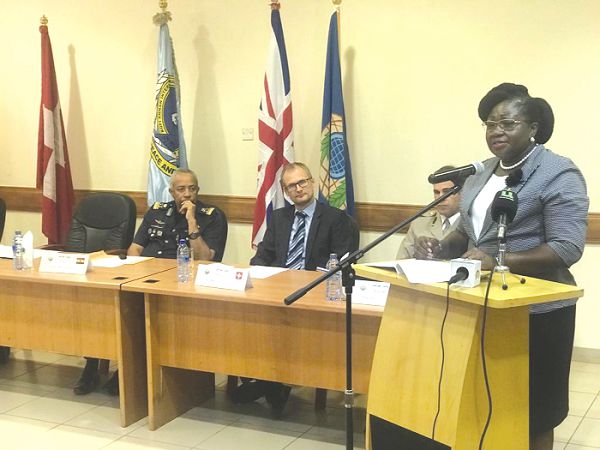
‘Establish chemical, toxic industrial weapons response team’
A Deputy Minister of Environment, Science, Technology and Innovation (MESTI), Ms Patricia Appiagyei, has called for the establishment of active and well-trained emergency response teams capable of handling chemical and toxic industrial weapons attack.
She said effective emergency preparedness was critical in lessening the impact of chemical disasters and that without such people, there could be loss of life due to the adverse environmental and economic impact from such attacks.
Advertisement
Event
Ms Appiagyei made the call at an emergency response training programme for agencies of member states of the Economic Community of West African States (ECOWAS) in Accra.
The workshop was aimed at equipping the agencies with knowledge, skills and the ability to be able to conduct necessary exercises in the aftermath of a chemical weapons attack or incident involving toxic industrial chemicals in the country.
The five-day programme that begun last Tuesday, is being facilitated by experts from a Swiss Nuclear, Biological and Chemical School, in collaboration with the Technical Secretariat of the Organisation for the Prohibition of Chemical Weapons (OPCW), and the MESTI, with support from the United Kingdom (UK) and Switzerland.
Advice
Ms Appiagyei urged the participants to take lessons from the training course seriously as they acquire new technologies and strategies on the subject.
"Indeed, we need to empower ourselves as individual nations, so that we can have a meaningful collaboration as State Parties to the Chemical Weapons Convention (CWC),” she added.
The CWC, which came into effect on April 29,1997, aims at eliminating an entire category of weapons of mass destruction by prohibiting the development, production, acquisition, stockpiling, retention, transfer or use of chemical weapons by member states.
Ms Appiagyei observed that industrial chemicals had played key roles in the development of many countries, bringing prosperity to its citizens.
“Nevertheless, we should not discount the dangers they pose to humans and the environment due to the special properties some of them possess which includes flammability and explosiveness,” she added.
To prevent chemical weapon attacks or incidents involving toxic industrial chemicals in the country, Ms Appiagyei stressed the need for awareness creation and recognition of potential threats, stressing that, member countries must stop dealing in, or use of chemical weapons.
Additionally, she said, there should be operational on-site monitoring systems for the early warning of chemical incidents.
CWC draft Bill
The Deputy Director of the MESTI and National Coordinator of the OPCW, Kwabena Quayeson, in an interview with the Daily Graphic, said some proposed amendments to the CWC draft Bill had been submitted to the Attorney-General’s office.
He said the convention had a responsibility to remove the stockpile of weapons that remained after the second world war.
“Many countries had stockpiles of weapons in their jurisdiction after the war so the convention has the responsibility to remove them and destroy them,” the director said.
Support
In a speech read on his behalf, the UK High Commissioner to Ghana, Iain Walker, said the resurgence in the use of chemical weapons posed a clear threat to international peace and security since it endangered the lives of innocent people.
“The international community must send a collective and clear message that the use of chemical weapons was unacceptable.
“The UK is focused on supporting the ECOWAS region, and we encourage all state parties to support the OPCW, the convention, and fully participate in this work,” the High Commissioner added.




